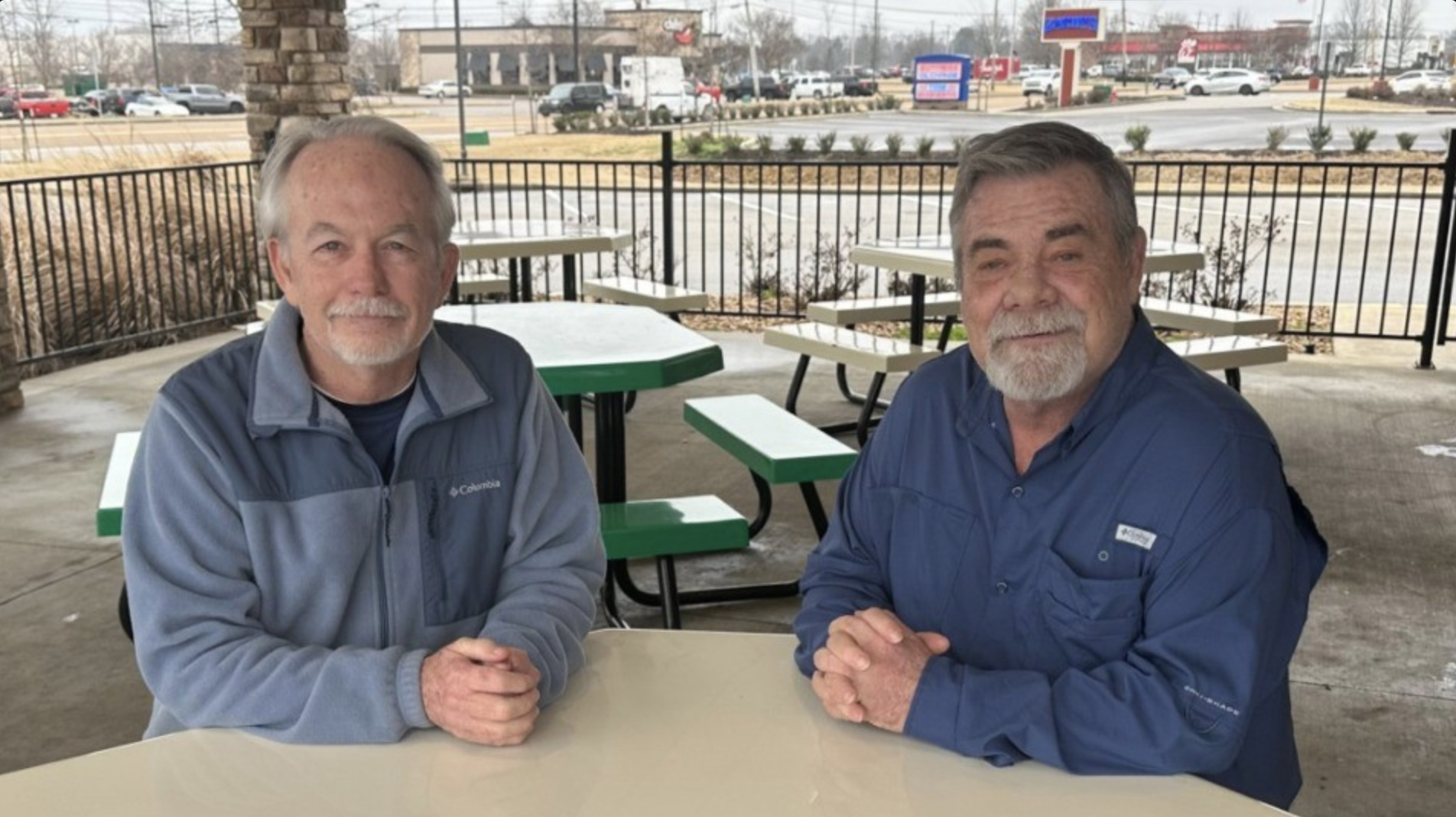
Both Wesley Fowler (left) and brother Randy suffered from a disease called dilated cardiomyopathy. It cost them their hearts, but thanks to organ donors, they have survived.
Geoff Calkins has been chronicling Memphis and Memphis sports for more than two decades. He is host of “The Geoff Calkins Show” from 9-11 a.m. M-F on 92.9 FM. Calkins has been named the best sports columnist in the country five times by the Associated Press sports editors, but still figures his best columns are about the people who make Memphis what it is.
As he lay in his hospital bed, waiting for a heart transplant, Randy Fowler wrestled with a question: Is it OK to pray for a new heart?
“For me to get a new heart, someone had to die,” he said. “How do I pray for that?”
Fowler met with a preacher. The preacher reminded him that tragedies happen.
“So I would pray every night that if someone died, they would be a donor, and that if it were God’s will, that heart would find its way to me,” Fowler said.
Not long after, a heart became available.
Fowler — a Tennessee fan — played “Rocky Top” on a musical keychain as he was wheeled into the operating room. That was 27 years ago.
“I’m still going,” said Fowler, 58. “We beat the odds.”
Wait, we?
Yes.
“My brother, Wesley, got his first heart two years later,” Randy said.
“He got another heart in 2020.”
Meaning, between them, the Fowler brothers of Covington, Tennessee, have lived more than half a century because three Tennesseans chose to be donors. So happy National Donor Day, everyone! What, you thought it was just Valentine’s?
“What better way to celebrate Valentine’s Day than by showing your heart and registering to become a donor,” said Kim Van Frank, executive director of the Mid-South Transplant Foundation.
Or, as Randy put it: “God wants your soul, not your organs.”
The Fowler brothers believe they can speak with some authority on this topic. When Wesley got his heart in 1999, they became just the second set of brothers to get heart transplants.
“We have a disease called dilated cardiomyopathy,” Randy said. “It’s genetic. My mother died of it at 36. My older brother died of it at 36, too. You remember that Boston Celtics basketball player who died of a heart attack?
Reggie Lewis?
“That’s what he had.”
By 1997, Randy’s heart had expanded so dramatically it didn’t leave room in his chest cavity to breathe.
“When I checked into Vanderbilt hospital, I wasn’t checking out unless I got a new heart,” he said. “By the time they put me under, I was totally at peace. When I woke up, it felt like the best nap I’d ever had. I could finally take a breath. It gave me my life back.”
Two years later, Wesley found himself in a similar state.
“I told God that if I lived, I would keep singing gospel music as long as I could,” he said.
Wesley belongs to a gospel quarter called “Crossing Jordan.”
Sure enough, he is still singing away.
But not just singing. Since he got his new heart, Wesley, now 60, has 1) jumped from a plane with a parachute, 2) become an experienced scuba diver, 3) earned a degree from the University of Memphis and 4) watched his kids grow up.
Randy and Wesley will both tell you No. 4 is the one that really matters. Randy’s daughter, Olivia, administers heart echocardiograms at Methodist Le Bonheur Healthcare — and teaches new students how it’s done.
“It makes me proud,” Randy says. “I remember that I used to say I just wanted to see her finish elementary school.”
And, yes, for these miraculous things to happen, someone had to die. Both Randy and Wesley have been in touch with the families of their donors.
“You can write letters,” Randy said. “At first, there are no names. But we exchanged letters and I finally got a name and number. One day, I called her. You talk about getting chills. I told her, ‘Ma’am, I’m the guy that received your son’s heart.’ She started crying and I started crying, and we talked about an hour.”
During the course of the conversation, the mother asked Randy if he wanted to know how her son died.
“She actually said, ‘Do you really want to know this?’” Randy said.
“Right then, I knew it was bad. She told me that he shot himself. And that was very sad. But you know what else? That man ended up saving five lives.”
Wesley is still in touch with the parents of his first donor. They became good friends.
“You can’t really explain the connection,” he said. “Without their son, I wouldn’t be here.”
Which is the point of National Donor Day, really. To give more people a chance to stick around. According to the U.S Department of Health & Human Services, there were more than 46,000 organ transplants in 2023. That’s a lot of scuba diving, parachute jumping, singing and child-raising. That’s a lot of lives being saved.
So think about becoming a donor, if you haven’t already done so. To register or get more information, go to MidSouthTransplant.org. Or when you sign up for your driver’s license, check the box that says you want to be an organ donor.
“You can tell by looking at your license if you’ve done it,” said Van Frank. “You should see a little red heart.”
